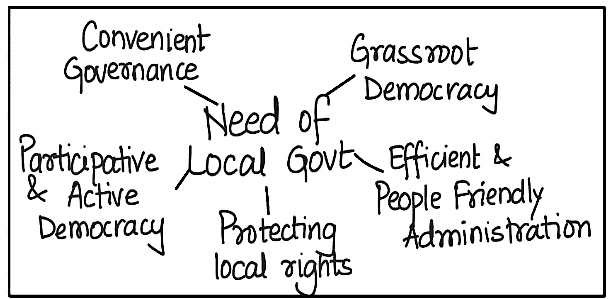UPSC Exam > UPSC Notes > Indian Polity for UPSC CSE > NCERT Summary: Local Governments
NCERT Summary: Local Governments | Indian Polity for UPSC CSE PDF Download
Local Governments: Decentralized Democracy
Local governments are instruments of decentralization and participatory democracy. It is government at the village and district level. It is the form of government which is closest to the common people.Why is local government so important for democratic decision-making and community development?
- Local Knowledge Required: Local knowledge and local interest are essential ingredients for democratic decision-making.
- Role of Local Governments: They are essential for efficient and people-friendly administration.
- Efficient Administration Under Local Government : It is convenient for the people to approach them to solve their problems both quickly and with minimum cost.
- Protecting the Local Interests: They can be very effective in protecting the local interests of the people.
- Purposeful Accountability: Strong and vibrant entities ensure both active participation and purposeful accountability.
- Citizen Involvement: Common citizens can be involved in decision-making concerning their lives, their needs, and above all, their development.

Nehru, Ambedkar, and Gandhi on Local Government
- Nehru: He looked upon extreme localism as a threat to the unity and integration of the nation.
- Dr. B.R. Ambedkar: He felt that the faction and caste-ridden nature of rural society would defeat the noble purpose of local government at the rural level.
- Gandhi: He believed that Indian independence should begin at the village level.
- He envisioned self-sustaining villages managing their own affairs.
- This decentralized structure would create a strong nation, resembling a pyramid with villages as its base.
What were the historical foundations of Local Governments in India before and after Independence?
Pre-Independence Local Governments in India:
- Village Communities: Self-governing village communities existed in India from the earliest times in the form of ‘Sabhas’ (village assemblies).
- Village Issue Resolution: In the course of time, these village bodies took the shape of Panchayats (an assembly of five persons), and these Panchayats resolved issues at the village level.
- Elected Local Government: These government bodies (the local boards) were created after 1882.
- Lord Rippon’s Initiative: Lord Rippon, who was the Viceroy of India at that time, took the initiative in creating these bodies.
- Government of India Act 1919: By the Government of India Act 1919, village panchayats were established in a number of provinces.
- This trend continued after the Government of India Act of 1935.
After Independence: Evolution of Indian Local Governments
- Community Development Programme (1952): The programme sought to promote people’s participation in local development in a range of activities.
- Three-tier System: In this background, a three-tier Panchayati Raj System was recommended for the rural areas.
- P.K.Thungon Committee (1989): The committee recommended constitutional recognition for the local bodies.
- 73rd and 74th Constitution Amendment Acts 1992: Local governments got a fillip after these two amendment Acts, as they provided for periodic elections to local government institutions, and enlistment of appropriate functions to them, along with funds.
 |
Download the notes
NCERT Summary: Local Governments
|
Download as PDF |
Download as PDF
Conclusion
- The Panchayati Raj system was introduced in 1993 through constitutional amendments, empowering rural and urban local bodies.
- This move aimed to decentralize power, enhance community participation, and address local issues effectively.
- Today, local government in India plays a crucial role in delivering essential services and promoting grassroots democracy.
The document NCERT Summary: Local Governments | Indian Polity for UPSC CSE is a part of the UPSC Course Indian Polity for UPSC CSE.
All you need of UPSC at this link: UPSC
|
145 videos|633 docs|203 tests
|
FAQs on NCERT Summary: Local Governments - Indian Polity for UPSC CSE
| 1. What is the significance of the 73rd and 74th Amendments in India? |  |
| 2. What are some key features of the 73rd and 74th Amendments? |  |
Ans. Some key features of the 73rd and 74th Amendments include the reservation of seats for Scheduled Castes, Scheduled Tribes, and women in local government bodies, the establishment of State Election Commissions to conduct elections, and the provision for devolution of powers and responsibilities to the local bodies.
| 3. How have the 73rd and 74th Amendments impacted the functioning of local governments in India? |  |
Ans. The 73rd and 74th Amendments have significantly empowered local governments by giving them constitutional recognition and autonomy in decision-making. These amendments have led to increased participation of marginalized sections of society in local governance and have improved the delivery of public services at the grassroots level.
| 4. What are some challenges faced in the implementation of the 73rd and 74th Amendments in India? |  |
Ans. Some challenges faced in the implementation of the 73rd and 74th Amendments include inadequate financial resources for local bodies, lack of capacity building among elected representatives, political interference in local governance, and resistance from entrenched power structures.
| 5. How can citizens actively engage with their local governments post the 73rd and 74th Amendments? |  |
Ans. Citizens can actively engage with their local governments by participating in local body elections, attending Gram Sabha meetings, monitoring the functioning of local representatives, and demanding transparency and accountability in the decision-making process. Active citizen engagement is crucial for the success of decentralized governance as envisioned by the 73rd and 74th Amendments.
Related Searches






















